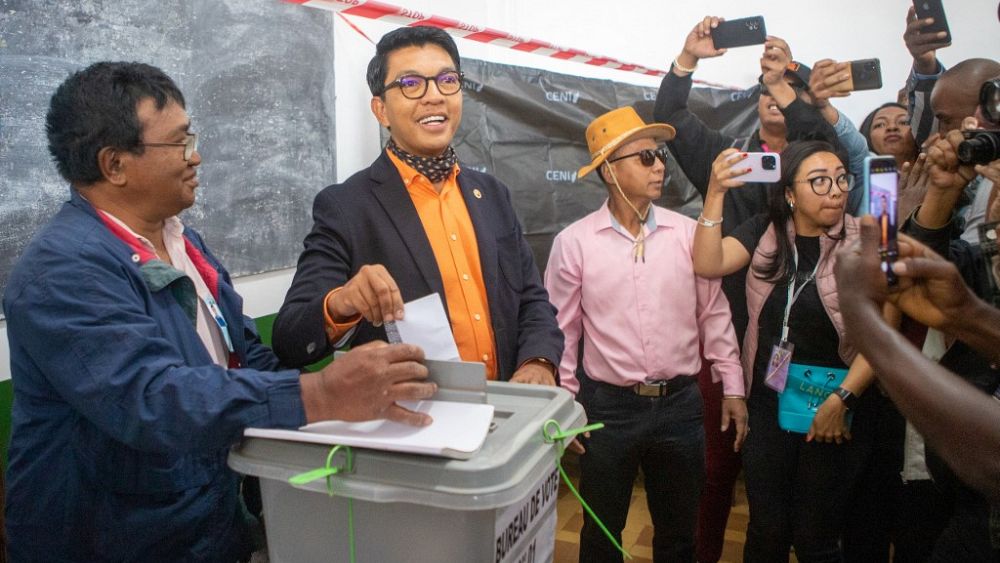One of the opponents who remained in the running despite the boycott, Siteny Randrianasoloniaiko appealed to the High Constitutional Court to demand the cancellation of the vote for fraud.
Andry Rajoelina was re-elected president of Madagascar at the end of the first round of a vote that ten opposition candidates had called to boycott and whose outcome they do not recognize, according to the results presented on Saturday by the electoral commission.
Andry Rajoelina, 49, who was running for a second term at the head of the large island in the Indian Ocean, won 58.95% of the votes cast, according to results announced at a press conference in Antananarivo and which must still be validated by the High Constitutional Court, the highest court in the country.
“The Malagasy people have chosen the path of continuity, serenity and stability”, welcomed Rajoelina to the press shortly after. Thanking voters for their “wisdom”, he assured that they “expressed themselves freely”.
Elected since 2018, Andry Rajoelina first came to power in 2009 thanks to a mutiny driving out former president Marc Ravalomanana.
Eleven million Malagasy people registered on the electoral lists were called to the polls on November 16. They had to choose between Rajoelina and twelve other official candidates.
But ten opposition candidates gathered in a collective, including two former presidents, had called on voters to “consider that these elections do not exist”. They refused to campaign.
The participation rate in the vote was just over 46%, down compared to the previous presidential election in 2018.
“What results? What election?”
A representative of the collective of opponents to a request for comment on Rajeolina’s victory replied “what results?” … The group had already announced on Friday that its members would not recognize the results.
“We will not recognize the results of this illegitimate election, riddled with irregularities, and we decline all responsibility for the political and social instability that could result from it,” they warned.
At this stage, the collective has not indicated any intention to take legal action to formally contest the outcome of the vote. Nor did they call for people to take to the streets again.
Almost daily and for weeks before the presidential election, the collective called for demonstrations in Antananarivo.
The protests, which were not massively followed, were regularly dispersed with tear gas.
The political crisis in the country was triggered in June by the revelation of the discreet French naturalization of Andry Rajoelina in 2014.
According to the opposition, this should prevent him from running but the courts refused to invalidate his candidacy.
The group of opposition candidates accused the government of maneuvering to reappoint Rajoelina and denounced “an institutional coup d’état”. They called for a suspension of the electoral process and the intervention of the international community.
Concerns abroad
Eight countries and organizations, including the United States and the European Union, have expressed their “concern” in recent months after tensions during demonstrations and denounced excessive use of force against the opposition.
The collective also denounced irregularities during the voting: closed polling stations, lack of ballot boxes, use by the outgoing candidate of state resources for his campaign.
One of the two opponents who formally remained in the race, Siteny Randrianasoloniaikoalso denounced ” worrying anomalies” which, according to him, “raise legitimate questions about the validity of the results”.
Later in the day, he also appealed to the High Constitutional Court, the highest court in the country, to demand the annulment of the vote.
“I filed two requests to request the annulment of the vote and the disqualification of Andry Rajoelina”said Siteny Randrianasoloniaiko.
The election took place “in regular and transparent conditions”, said Saturday Arsène Dama, president of the electoral commission whose impartiality is questioned by the opposition, which accuses the organization of being “at the boot of power.
The electoral commission also accused the “ambient political climate” as well as “manipulation of opinion” of being at the origin of the lack of participation in the vote.
Appeals in the event of disputes can be filed within a maximum of 9 days before the proclamation of the final results by the High Constitutional Court.



